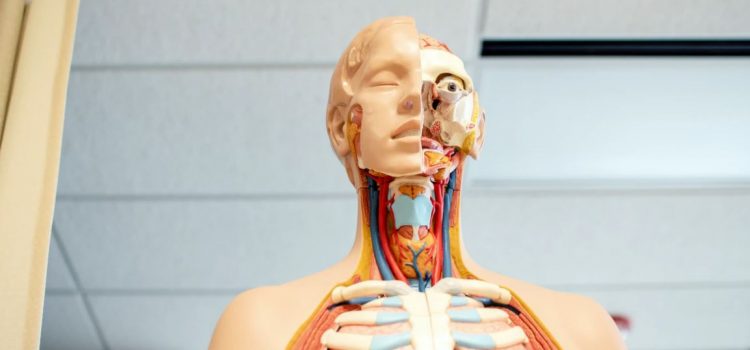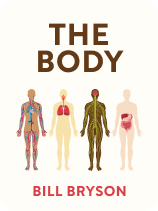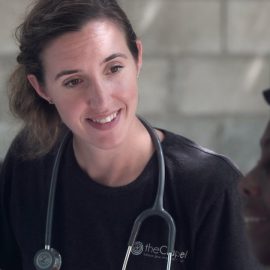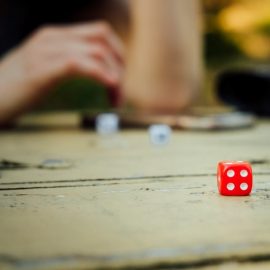

This article is an excerpt from the Shortform book guide to "The Body" by Bill Bryson. Shortform has the world's best summaries and analyses of books you should be reading.
Like this article? Sign up for a free trial here .
What is Bill Bryson’s The Body about? How can you use the advice from the book to live a healthier lifestyle?
In his book The Body, Bill Bryson takes the reader on a whirlwind tour of the human body’s various systems. He examines how they work, how they can fail, and what can be done to fix them when that happens.
Here’s a brief overview of the key takeaways from The Body by Bill Bryson.
Limit Your Calorie Intake
In The Body, Bill Bryson explains that, in the West, we face daily temptation to overeat because our bodies adapted to a prehistoric lifestyle that involved different challenges than the ones we face today. Prehistoric humans subsisted by hunting and gathering, which required them to expend a great deal of energy in obtaining their food. As a result, they instinctively gravitated toward the most calorie-dense food they could find and conserved their energy whenever possible.
As Bryson points out, our bodies still retain these instincts. If we consume more food than we need, our bodies store up the surplus as fat reserves to be used later. In a hunting-and-gathering society, these instincts facilitated our survival.
But, according to Bryson, when our ancestors developed agriculture, the abundance and types of food that were available began to change faster than our bodies could adapt. And recent developments like mechanized farming and food processing have only widened the gap. Thus, in modern times, following our instincts puts us at risk of obesity and malnutrition because most of us can access food in almost unlimited quantities without much physical exertion.
Not only is the modern abundance of food unprecedented, but so is its calorie content. Bryson reports that food processing factories add a great deal of sugar even to foods that don’t intuitively seem sweet. For example, spicy horseradish sauce has about the same amount of sugar per unit volume as apple pie.
And sugar isn’t all they add—fats and oils are also common ingredients in processed foods. Bryson writes that, at best, these fats impart additional calories that we don’t need. At worst, they poison us, as in the case of trans-saturated fats, commonly known as trans fats. Trans fats don’t occur in nature—scientists created them in a laboratory in the early 1900s as a supposedly healthier alternative to animal fats. They were a common ingredient in many processed foods throughout the twentieth century, despite published research that showed they were toxic as early as the 1950s. In the United States, the use of trans fats in food wasn’t prohibited until 2018.
Furthermore, Bryson points out that it isn’t just processed food that’s unnecessarily high in calories. Even modern fruits and vegetables contain far more sugar than they used to because they have been selectively bred for sweetness over the course of human history.
Get Enough Vitamins
As we’ve discussed, modern society enjoys an abundance of food, but despite this, many people today suffer from vitamin deficiencies. Bryson points out that, in a sense, this is actually because of the abundance of food: Our hunter-gatherer ancestors ingested plenty of vitamins and minerals because they had to eat every berry and root they could find just to meet their daily calorie needs. But modern foods are so high in calories that we can get more than enough calories without getting nearly as much variety of nutrients.
How Much Is Enough?
According to Bryson, scientists unanimously agree that your body needs just the right amount of each vitamin and essential mineral to function properly: Getting too much or too little of a given nutrient are both dangerous. Unfortunately, scientists don’t agree on how much of each is the right amount, or even which ones are essential.
For instance, most scientists agree that sodium (which we get mostly from salt) is an essential mineral. However, some argue that a high sodium intake (3,000 mg per day or more) increases your risk of heart attack and stroke, while others argue that, unless you suffer from certain heart problems, high sodium intake actually reduces your risk of heart attack and stroke.
In addition to sodium, Bryson discusses arsenic, a mineral that most of us regard as poisonous. Scientists agree that arsenic (in small amounts) is actually an essential mineral for some animals. Yet they disagree about whether it is essential for humans. If we do need it, we certainly don’t need very much of it.
Rounding out his discussion of the differences of scientific opinion on appropriate doses of vitamins and minerals, Bryson recounts how biochemist and Nobel Laureate Linus Pauling claimed that large doses of vitamin C (3,000 mg per day) would prevent the common cold and improve the recovery rate of cancer patients. But similar studies published by the Mayo Clinic concluded that large doses of vitamin C showed no statistically significant benefit.
Recognize the Power of Your Sense of Smell
In addition to discussing what we eat, Bryson discusses how we perceive what we eat. He explains that flavor is actually a mental construct that your brain assembles from a variety of sensory inputs, not just taste. The smell of a food has a greater influence on how you perceive its flavor than its taste does, perhaps because your sense of smell is more refined than your sense of taste: Your body only has about five types of taste receptors, but it has roughly 400 types of smell receptors.
To illustrate the sensitivity of human smell, Bryson recounts an experiment where researchers dragged various scented objects, such as a piece of chocolate, across an athletic field. Then they asked students to follow the scent trail on their hands and knees, sniffing the grass. Most of the participants succeeded in following the scent trail accurately. Many of them even outperformed dogs at following scent trails.
Eat Spicy Foods
Bryson’s discussion reveals that sometimes our nutritional needs can be counterintuitive: Some foods that cause us physical pain, like hot peppers (and foods containing them), can be good for us.
Bryson references studies showing that eating hot peppers provides a number of benefits, including alleviating high blood pressure, reducing your risk of cancer, and increasing your life expectancy. They also cause your body to release endorphins, creating a sensation of pleasure, at the same time that they create a sensation of burning pain in your mouth.
Recall that multiple senses influence your mental perception of a food’s flavor. In the case of hot peppers, pain is one of the senses that influences flavor, because peppers contain a chemical (capsaicin) that artificially stimulates the thermal pain receptors in your mouth, rather than stimulating your taste buds.
Practice Proper Hygiene
In addition to what you feed your body, the microbes that you expose your body to can have a significant impact on how well your body works. Bryson explains that your body is inhabited by trillions of microorganisms from thousands of different species.
We can infer two main applications from Bryson’s explanation of viruses, bacteria, and how these pathogens can be transmitted from one person to another.
Wash Your Hands
First of all, Bryson’s discussion highlights the importance of washing your hands to avoid transferring pathogens from one person to another—especially if you work in the medical industry.
Bryson points out that most of the microbes that call your body home live inside you and don’t survive outside the body well enough for scientists to even study them effectively. However, a few hundred species of bacteria make their home on your skin, where they readily spread from one person to another by physical contact. Moreover, the particular species are different from person to person, and some species are harmless to one person but infectious to another.
Similarly, Bryson points out that even when you are completely healthy, there are thousands of types of viruses inside your body, as well as in the surrounding environment. Less than 0.3% of all known viruses are disease-causing, but like bacteria, viruses often affect different people differently. For example, studies estimate that the Covid-19 virus is relatively harmless to at least 45% of the people who contract it, but it causes severe or even fatal illness in others.
Furthermore, Bryson explains that you have to scrub your hands with soap and water for at least a whole minute to wash off viruses and bacteria. He estimates that, even in modern-day American hospitals, inadequate hand-washing leads to more than a million serious infections per year.
Don’t Skip Your Workout
Just as what you feed your body and the microbes you expose it to affect how well it works and how long it lasts, so does how you use your body. In particular, Bryson presents a number of reasons why you should exercise.
He notes that all your joints are lined with cartilage, which, unlike the rest of your bodily tissues, doesn’t have a blood supply. The only way your body can maintain the cartilage in your joints is by circulating the synovial fluid in your joints, and the only way you can make your synovial fluid circulate is by moving your joints. If the cartilage in your joints deteriorates too much, movement becomes painful and difficult, a condition known as osteoarthritis.
Furthermore, Bryson says that exercise not only strengthens your body, but also bolsters your immune system, improves your mental health, and reduces your risk of heart attacks, diabetes, and cancer.
Get Enough Sleep
As we’ve discussed, being active plays an important role in keeping your body functioning properly, but so does resting. In particular, Bryson’s discussion emphasizes the danger of not getting enough sleep. He discusses a study that found the US economy loses about $60 billion per year to sleep deprivation. This is because sleep-deprived workers are less productive, and Americans are now sleeping an average of two fewer hours per night than we did 50 years ago.
Furthermore, Bryson asserts that sleep deprivation can be fatal. He provides two pieces of evidence for this. First, he cites a study in which lab rats were prevented from sleeping: All the rats died within a month. Autopsies of the rats showed no particular cause of death—after a certain amount of time without sleep, their bodies just shut down.
Second, he discusses a rare genetic disorder that can cause people to completely lose the ability to sleep. There is currently no effective treatment for the disorder, and every documented case has proved fatal: Without sleep, the victim’s organs eventually stop functioning.
Limit Medications
We’ve discussed several things you can do to keep your body functioning well, but now let’s turn our attention to what happens when you do get sick or injured. As he considers the body’s various ailments, Bryson discusses many historical and modern medical practices, covering the whole spectrum from ingenious to horrifying.
Two problems that he notes are still prevalent in the US today are overtreatment and failure to take gender into consideration when designing or prescribing medications. We’ll now consider these problems and what you can do about them.
Beware of Overtreatment
Bryson asserts that overtreatment (medical treatment beyond what would actually be beneficial) is a common problem in the developed world, especially in the United States. As such, whenever a doctor proposes treatment, take a moment to critically consider whether the treatment would actually help. Bryson discusses three particular situations that lend themselves to overtreatment:

———End of Preview———
Like what you just read? Read the rest of the world's best book summary and analysis of Bill Bryson's "The Body" at Shortform .
Here's what you'll find in our full The Body summary :
- A whirlwind tour of the human body’s various systems
- Why your sense of smell is probably as good as your dog’s
- How hot peppers increase your life expectancy






